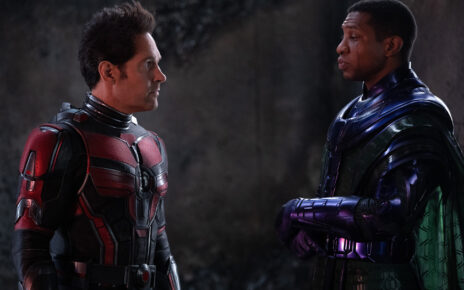Fitting that this film begins with an actual train wreck because what followed is best described as a metaphorical train wreck.
Atlas Shrugged: Part I may just be the most callous film ever made. And while that may be the point – we’re served a political treatise rather than an actual film here – the laissez faire attitude described can’t exist in a world in which people actually care about … things. Set in the year 2016, where gas prices are so onerous that people now only take trains (?!), Atlas begins with a massive train crash in the Rockies. “Oh the humanity”? No, forget humanity. In the wake, Atlas focuses 100% on the economic end of the disaster. There’s more business in this film than Wall Street. And while that may excite a certain crowd, a certain non-movie-going crowd, Atlas doesn’t even get the business parts right. When a disaster happens, especially one that re-routes economies, people lose jobs. Law suits are filed. Companies go out of business. What do we focus on here? “New track needs to be built and we’re going with a different steel company.” We see shots of the downtrodden masses only for the sake of coloring the economic conditions. Screw ‘em; this film only cares about rich folks. Now how about that future of ours? Middle-east chaos? Easy to imagine. Likely in fact. Oil prices through the roof? Gasoline denied to the masses? Yes, good consequence. What do we do? We turn to railroads? That can’t be right. We don’t update car technology or switch to mass communication scenarios? We take a bold step back to the 19th Century when train ruled the landscape.
I’m sorry, does this happen in the book? That’s ludicrous. Your “eerie future dystopia” scenario is less likely than the one in Timecop.
The acting and directing in Atlas Shrugged: PART I is so bad that one tries to pick out where the film is actually being shot, “hey, it’s a library!” “The local high school gym!” I was quite surprised the logos looked professional; can’t believe they had budget for that. The writing is comically awful — every single scene ends with a cryptic statement and a stinger. Wait. Wait. I’ve seen this? Dan Brown novels? Hmmm, close, but there’s occasionally something of interest in those. Ahhh, I know. Mad Dog Time. One has to go back to Mad Dog Time to find a script this absurd in format.
Did I mention the global warming analogy? Part of the problem with our oppressive future government is that all quality scientific study is done in private. This “National Science Institute” deliberately professes misleading positions of government interest in order to sway public opinion. I know, I know: Anyone with a memory and an ounce of integrity will recall how the Bush administration paid scientists $10,000 each in order to debunk Global Warming. Not just investigate, mind you, but deliberately come to a pre-ordained conclusions of government interest. Oooh, art mimicking life. Hey, wait a minute. Wasn’t the Bush administration all about less government and letting capitalism dictate all by reducing the oppressions on wealthy folks? Isn’t that what you want? You guys need to get your story straight.
Did I mention the climax? The pinnacle of this thriller centers on a train riding over a bridge. Yes, a train on a bridge. And we already know the outcome because the main character is on the train. This personally gets my vote as worst.climax.ever. I dare you to find a less interesting focal point in any film. Go on. Try.
“Who will be left to run the machines?” One of the mysteries of Atlas is the super-capitalists keep disappearing leaving mediocrities behind to run the show. At first, this heavy-handed political statement made me angry: are you the same people who espouse asininities such as, “Wal-mart is doing the world a favor when it doesn’t offer a living wage”? And then, as it sank in, I got a little scared. What if it comes true? What if the unfairly oppressive taxes levied upon our already most burdened citizens cause them to withdraw from society? What if the self-appointed billionaire messiahs like Donald Trump leave us alone? How can we fill that gap? Do you know how hard it is to train a chimpanzee to say: “You’re Fired!” on cue? Oh, it gets harder than that – the chimp also has to wear a bad toupee. Seriously people: WE ALREADY CATER to the country’s billionaires. Don’t think so? Oh, you sad, sad folks. We elected a half-wit oilman president. He made decisions like a half-wit oilman and then we reelected him. We need to fear socialism? Yeah, like we need to fear Godzilla.
Did you really just suggest this country is in serious danger of redistribution of wealth? Wow. Um, no. In fact, the opposite reason is why the economy sucks right now. Sorry you missed that lesson. By all means, protect the rights of the top 1%; they’re the ones making all the moves that help us get better, can’t you tell? This movie doesn’t give a crap about anybody who isn’t ultra-wealthy, and you know what the funniest thing is? In Atlas Shrugged: PART I, the ultra wealthy don’t exactly seem happy. The fools among them are unsatisfied, and the elite among them feel let down. One fella puts off greeting the Elysian Fields by setting fire to his oil fields for the purpose of … of … well I don’t know, maybe they explain that in Part II. What kind of ego do you have to have to say, “not only do I owe nothing to a society in which I became a billionaire, I’m going to add some hefty troubles to it as I go”? Pathological self-delusion: it’s not just for serial killers any more.
You people are morons.
Which brings me to my climax: I have never been more out-of-touch with an audience. This includes every Tyler Perry movie in which I was the only white person in attendance. This includes the Steve Martin Pink Panther in which a person in front of me laughed out loud fifty separate times. A couple blocked the theater entry ramp as I attempted to get to a seat. No excuse. No apology. Fits, I suppose. Isn’t Ayn Rand’s “Objectivism” basically about “every man for himself”? Common courtesy is for the masses, chump. During the film, I alone met the grandiose speeches and cryptic conclusions with (spontaneous uncontrollable) laughter. When the film ended, I rose and practically sprinted out of the room, keen to distance myself from the metaphorical carnage on screen. What’s that? Applause? Oh, you have got to be kidding me.
Imagine an entire room filled with people watching an infomercial on tax preparation and then applauding at the end and you have a good idea of what I’m up against. What are you applauding? It can’t have been the movie. A philosophy that says, “fuck the poor”? A day in the life of a billionaire? Keep making sure the billionaires get their way and you’ll keep seeing this country exactly going in the direction it’s been heading since the century began. Good call.
Atlas Shrugged was conceived in three parts, but the production geniuses here happened upon the infinitely more expensive route of filming them one at a time (thus potentially jeopardizing the sequels). Always nice to get an economic lecture from folks who have no idea about sound monetary policy.
Rated PG-13, 97 Minutes
D: Paul Johansson
W: John Aglialoro & Brian Patrick O’Toole
Genre: Poorly displayed propaganda
Type of person most likely to enjoy this film: Scrooges
Type of person least likely to enjoy this film: Realists




I haven’t read Atlas Shrugged so I can’t speak to the plot, but I have read The Fountainhead, so I can speak to Ayn Rand’s philosophy, which is indeed “Fuck the Poor.” Or rather, “If you’re rich, you pulled yourself up by your bootstraps. If you’re poor it’s your fault, so fuck you.” However much I loathe her though, Rand’s dialogue and storytelling are surely better than what you’ve reported here. So spread the blame around.